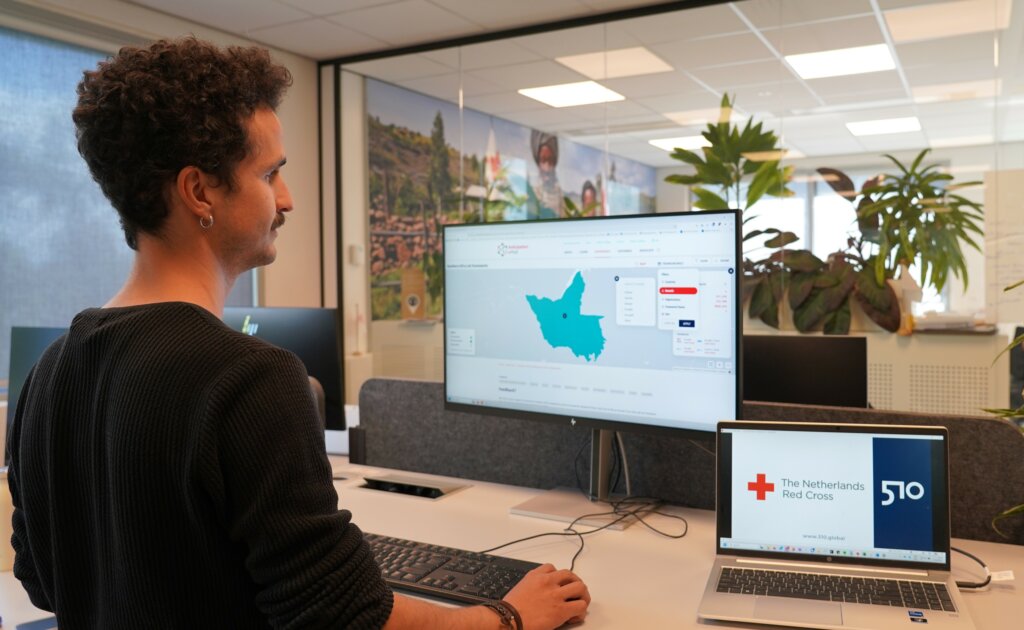In conversation with Daniele Castellana

At the Netherlands Red Cross’ data and digital team, 510, we believe that behind every innovation is someone whose skills and vision make humanitarian action faster, smarter, and more inclusive. Our Humans of 510 series shines a light on these individuals: the journeys that brought them here, the projects they’re proud of, and the real-world impact of their work. In this edition, we meet Acción Anticipatoria Technical Project Coordinator Daniele Castellana, who brings a climate science lens to humanitarian data and thrives on turning abstract challenges into tangible solutions through curiosity and human connection.
Can you tell us about your background and how it led you to 510?
I studied physics and did a PhD in climate physics, driven by a passion for natural sciences and understanding how the world works. But over time, I felt the impact of my work was too abstract and I wanted a role where working with people is more central. I wanted to do something more tangible and closer to finding solutions to real-world needs. I started exploring data science roles in non-profits focused on humanitarian, social and environmental issues. After working for an environmental company, I discovered that data roles in the humanitarian sector do exist! I initially connected with 510 as a volunteer and was amazed at this team that finds data and digital solutions to common humanitarian problems. When the opportunity came to join as a project coordinator, I took the leap. That was three years ago, and I’m still here!
What does a typical day look like in your role?
The first word that comes to mind is fast-paced. I juggle many tasks across different projects, and develop proposals for new ones. I interact with lots of people throughout the day, which I really enjoy. There are plenty of emails and messages, and while I try to block time for focused work, I always leave space for unexpected tasks. That flexibility is key to thriving in this role.
How do you collaborate with partners around the world?
I work with partners across the Red Cross Red Crescent Movement, as well as research and climate institutes, and other humanitarian organizations. Most collaboration happens online through various platforms, but in-person visits are incredibly valuable. Spending two weeks with a partner National Society can be more productive than months of virtual meetings. I also attend global and regional conferences in the Anticipatory Action sphere. A recent visit to Uganda with the Malaria Consortium and the Uganda Red Cross Society was especially impactful: we met with several partners to conduct user research together. Sitting around the table and discussing, in person, how to support the country’s health system for epidemic preparedness and response made a real difference in shaping our work.
How do you see data and digital tools changing the humanitarian sector?
Working in climate science showed me the power of data-driven decisions to make a difference. One reason we struggle with the climate crisis is that not enough decisions are grounded in scientific evidence. When presented clearly, data can reduce subjectivity and build a shared understanding. Data helps to bring transparency, efficiency, and evidence for advocacy. For example, we collaborated with several organizations to build an Anticipatory Action Frameworks Database for Southern Africa, giving users access to data they can use to advocate for proactive disaster preparedness with their governments. At the same time, data is never completely neutral. How it is presented shapes the story it tells. There are real risks around bias and privacy. That’s why human judgment, as well as data privacy and responsibility remain essential. Data and AI can empower us with greater agency to make informed decisions, but they should complement, never replace, human perspectives.
What motivates you to keep doing this work even when it’s difficult?
People. A good day is one where I connect with colleagues and partners, reach agreements, and find common ground. I love working at 510 because it’s full of kind, motivated people with diverse perspectives and a shared commitment to make impact. It’s a space where I can think critically and speak openly. That’s what makes it a good place for me.
DESCARGO DE RESPONSABILIDAD: Tenga en cuenta que las versiones en árabe, francés y español de este artículo se han generado automáticamente mediante Inteligencia Artificial. No podemos garantizar la total exactitud de estas versiones.
Queremos conocer su opinión.
Are you interested in pursuing similar solutions with your National Society? Please reach out to
Coordinador de servicios, Acción Anticipatoria: Aklilu Teklesadik ateklesadik@redcross.nl